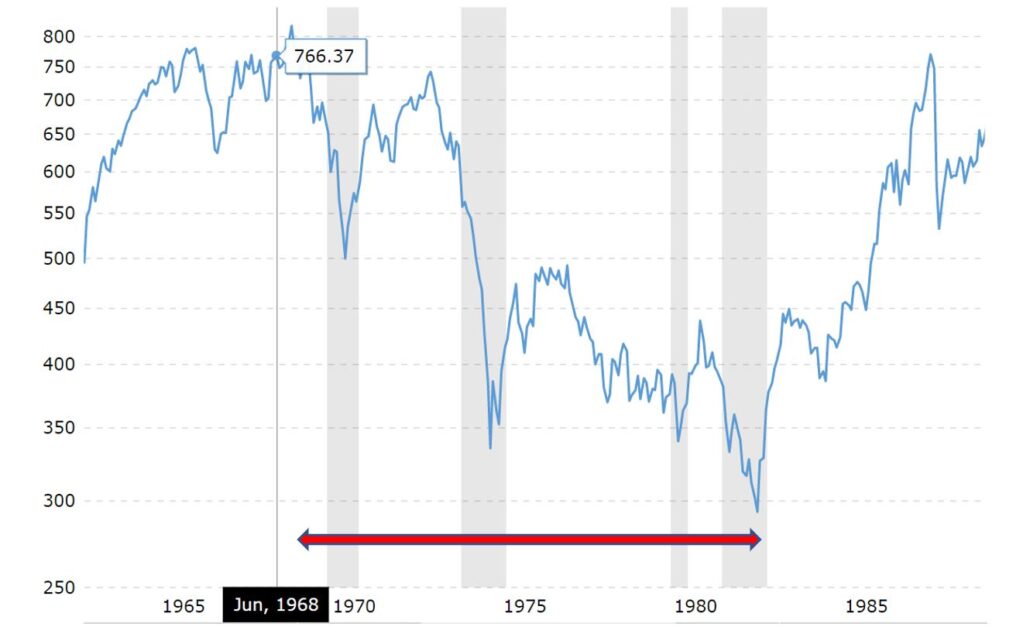Inflation scares made headline news last week and major indexes were sold off as the US Consumer Price Index (CPI) reportedly increased to 4.2%, the fastest in a 12-month period since 2008.
This brought fear in the stock market that inflation would go out of control, as the CPI increment rate creeps closer to that of the 1970s to early 1980s, which were high inflationary periods in history. (CPI was reported to have increased by 4.7% in 1968 to 13% in 1979)
What does this mean for investors?
Well, during high inflationary period of the 1970s to early 1980s, the stock market performed poorly:

The US central bank had to step in to raise interest rates gradually to 18% to control inflation, which resulted in another recession.
(Inflation refers to a general rise in the price of goods and services, and the US CPI measures a basket of goods as well as energy and housing costs.)
But wait, there’s more.
Before you panic, you should know that…
Inflation is both good and bad
At extreme ends, deflation or high inflation is detrimental to the economy and businesses.
Japan is a classic example of an economy suffering from decades of low inflation and deflation. The Japanese government has been trying without much success to increase their inflation rate to 2% to revive their economy.
An economy without healthy inflation would be stagnant.
While lower prices would generally benefit consumers, a steady fall in overall prices over long periods can lead to a sluggish economy of low corporate investments and stagnant wages. This was what happened to the Nikkei index when GDP did not grow due to a sluggish economy:

Inflation is the hidden tax
As investors, we are concerned about inflation because it affects how we value the future cash flow of a business.
$1 today is more valuable than $1 in the future due to inflation.
In a discounted cash flow valuation model, we have to discount the Future Value (FV) of the business to Present Value (PV) by estimating what is the risk-free interest rate or how much would inflation be like in the future.
For consumers, your purchasing power weakens over time because of inflation. In order to win against inflation, individuals have to increase their earning power and make their money work harder aka produce returns higher than the rate of inflation.
Likewise for businesses, if the average nominal return on equity is 12% post-tax, an inflation rate of 7% would give a real return on equity of 5%. (this is a simplified way of calculating real returns, excluding the compounding effect)
Therefore, inflation is the hidden tax. Lower inflation would give investors higher real returns and higher inflation would erode real returns.
How should we navigate investing assuming this will be a high inflationary environment?
As individuals, we want to increase our earning power more than the rate of inflation. The higher earning power, the better.
Same for businesses, a wonderful business would be able to pass on the inflationary cost to customers. Over the long term, if they can increase prices faster than their cost of goods and services, inflation should not be a big concern.
5 ways companies can improve earnings/returns
I took reference from Warren Buffett in his 1977 Fortune article: “How Inflation Swindles the Equity Investor”.
1. Increase in turnover
Increase in turnover simply means increasing sales and revenues.
Return on equity would improve if the business can pass on the increase in costs to customers.
A superior business would be asset light, does not need to manufacture products or services and has subscription-based recurring revenues.
2. Access to Cheaper leverage
A high inflationary environment generally causes interest rates to go up. This would depress return on equity.
Businesses that can reduce their cost of borrowing by raising capital from shareholders through stocks or convertible bonds with minimal stock dilution would benefit.
3. More leverage
More leverage would also boost return on equity.
However, businesses that require high debt to operate would likely be poor performers during periods of high inflation as cost of borrowing goes up.
Businesses with low debt would be able to take on more leverage to increase return on equity.
4. Wider operating margins
Businesses that have economics of scale, are asset light (use little capital), have higher sales efficiency and low cost of goods and services will command higher operational efficiency.
These great businesses will have higher margins.
5. Lower income taxes
This is obvious, lower income taxes would boost returns.
But this is seldom in any businesses’ control. We can never legally escape from taxes.
Inflation affects everyone
In periods of high inflation, generally all businesses would be affected.
It is the same situation for taxes, all businesses are subjected to the same tax rates in their own state. There is no preferential treatment. Businesses cannot control the rate of inflation and taxes. They face the same macroeconomic difficulties.
Even so, not all businesses are equal.
Which type of businesses make great investments?
There are businesses that will do better regardless of the macroeconomic headwinds. This is why I focus on the business and not macroeconomic factors that I cannot control.
I prefer businesses that can improve their earnings by using the first 4 ways mentioned above. Such companies are usually Technology and Subscription-as-a-Service (SaaS) businesses and investors would likely outperform the market, over the long term if they did not overpay for them.
Historically, the Nasdaq consisting of some tech heavy companies have outperformed the S&P 500 during inflationary periods:

Even Buffett had commented on high growth technology companies, saying that:
they take very “little capital to grow a lot” and are superior businesses.
You can listen to Buffett’s thoughts on tech stocks in this video:
Historically, technology companies have been shown to deliver higher returns:

At a fair price, these are superior growth stocks to own.
Prices have corrected significantly and I am adding more shares.

